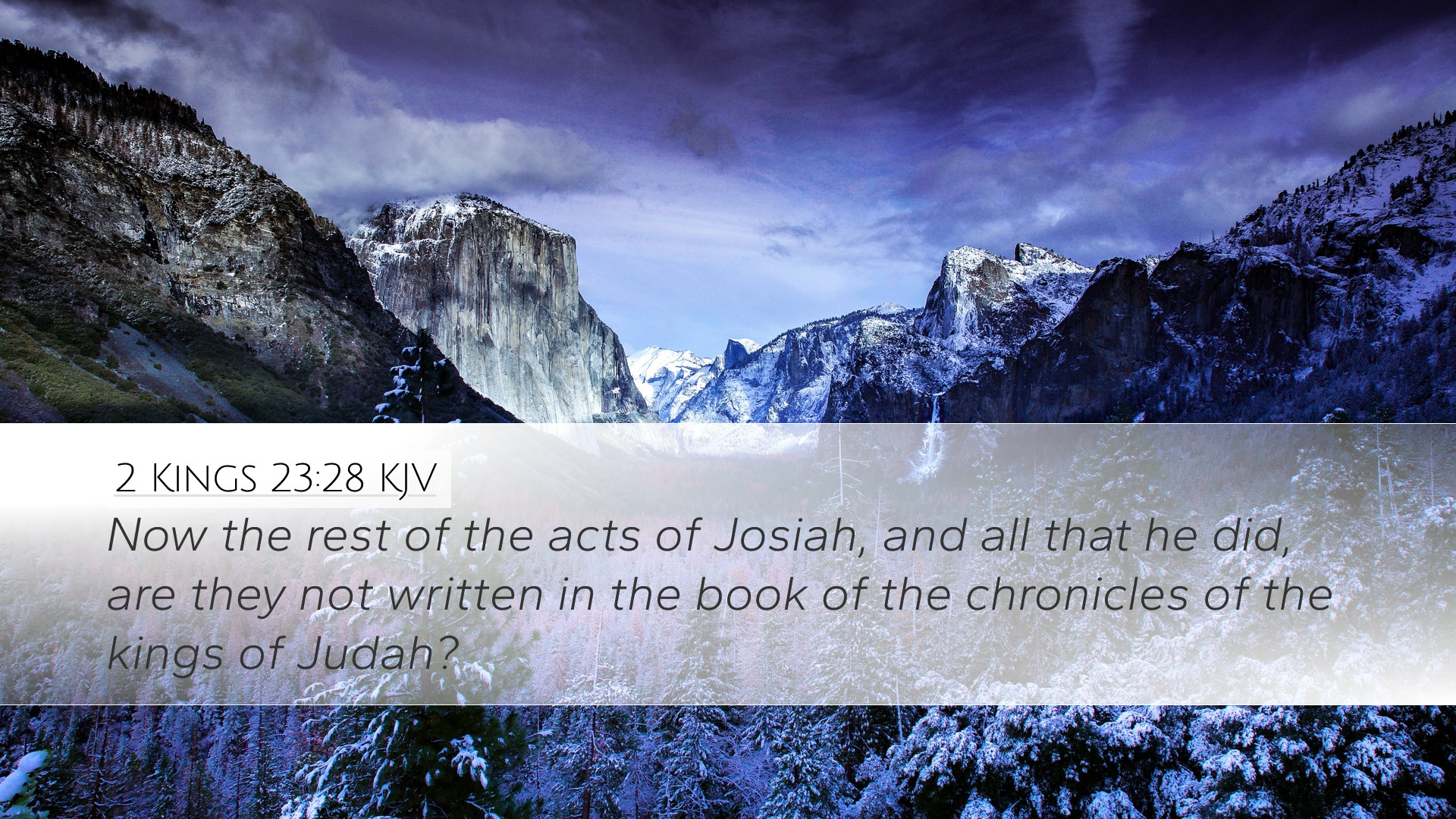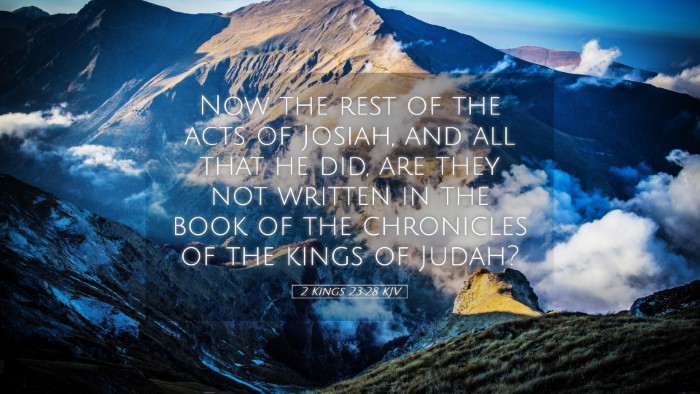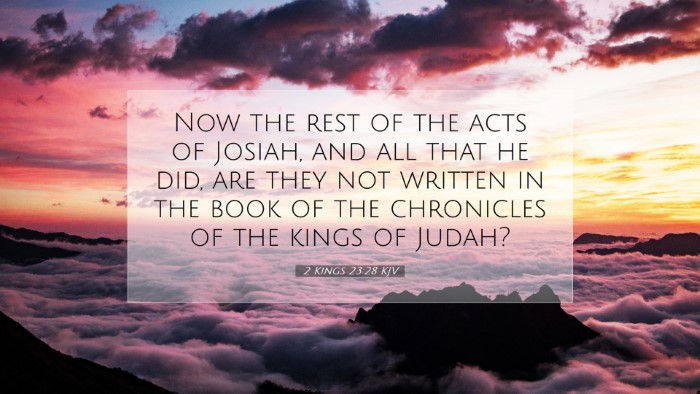Commentary on 2 Kings 23:28
Verse Context: 2 Kings 23:28 presents a profound moment in the narrative of Judah’s history, focusing on King Josiah's reign, his reforms, and the consequences following his death. This verse reads: "Now the rest of the acts of Josiah, and all that he did, are they not written in the book of the chronicles of the kings of Judah?"
Historical Background
The reign of King Josiah (640-609 BC) is critical in understanding the religious evolution of Judah. He ascended the throne at a young age and initiated significant religious reforms aimed at restoring true worship of Yahweh. This activity culminated in the discovery of the Book of the Law, leading to a national covenant renewal.
Insights from Matthew Henry
Matthew Henry emphasizes the importance of Josiah's reforms and his dedication to turning the nation back to God. In his commentary, he notes the profound impact of Josiah's leadership:
- Revival of True Worship: Josiah actively destroyed idols, reinstituted the Passover, and sought to restore the temple worship, which reflects his commitment to God's covenant.
- Josiah's Death: Henry highlights a somber note in Josiah's narrative, warning that despite his faithfulness, the outcomes for Judah included inevitable judgment due to the nation's persistent sinfulness.
- Legacy of Righteousness: The verse acts as a reminder that even in times of great reform, the faithful can only do so much, and the historical trajectory of the nation can often override individual righteousness.
Insights from Albert Barnes
Albert Barnes provides a detailed examination of the implications of this verse, enlightenment on both its historical and theological dimensions:
- Chronicles of Kings: Barnes points out the significance of the "book of the chronicles," suggesting that the records therein serve as a testimony to Josiah’s efforts and the collective memory of Israel's history.
- Judgment Foretold: He also remarks on the divine judgment that looms over Judah post-Josiah. Despite his efforts, the people's hearts were not fully turned back to God, which would lead to their eventual destruction.
- Importance of Preservation: Barnes stresses the importance of maintaining records of God’s faithfulness through leaders like Josiah and how these records can inspire future generations.
Insights from Adam Clarke
Adam Clarke delves deeper into the nature of historical writings and their implications in understanding God’s providence:
- Civil and Religious Reformation: Clarke points out that Josiah’s reign was marked by a convergence of civil governance and religious reform; this duality reflects the biblical model of leadership.
- Moral Integrity and Decline: Clarke cautions that moral integrity in leadership does not guarantee societal transformation, citing the immediate declines that followed Josiah’s death, illustrating a theological motif of human fragility.
- Reflection on Divine Mercy: He also notes that even amidst impending doom, God's mercy continues to shine through through figures like Josiah, which serves as a precursor to eventual restoration.
Theological Reflections
As we analyze this verse and reflect on the commentaries, several theological implications arise:
- The Role of Leadership: Josiah exemplifies the responsibility of leaders in guiding their communities in faithfulness to God. Pastors and leaders today can draw from his example in advocating for serious spiritual reform and commitment to God’s truths.
- Historical Record Keeping: The emphasis on recording deeds (as seen in the "book of chronicles") speaks to the necessity of maintaining historical narratives that honor God's actions in the world. This not only informs but also inspires future generations.
- God’s Sovereignty amidst Human Actions: While Josiah’s actions were noble, the eventual fate of Judah underscores a divine sovereignty that operates within the confines of human free will, highlighting the interplay between divine justice and mercy.
Contemporary Application
For modern-day believers and scholars, 2 Kings 23:28 serves as a poignant reminder of several key principles:
- Commitment to Reform: Just as Josiah sought reform, contemporary Christians are called to assess and reform their practices and communal worship against the backdrop of Scripture.
- Awareness of Historical Contexts: Understanding the history of faith leaders and communities can provide critical insights into current practices and challenges in the church.
- Preparation for Judgment: The verse's historical reflection serves as a warning that continued neglect of God often leads to societal decay, reminding leaders to remain vigilant in their spiritual stewardship.
Conclusion
In summary, 2 Kings 23:28 is not just a record of historical events but also a rich theological narrative that speaks to present-day faith challenges and leadership responsibilities. The insights gleaned from Matthew Henry, Albert Barnes, and Adam Clarke converge on the themes of reform, the role of leadership, and the importance of historical records in the life of faith. As we remember the legacy of Josiah, may we be inspired to lead with commitment, integrity, and a deep reliance on God's grace.


